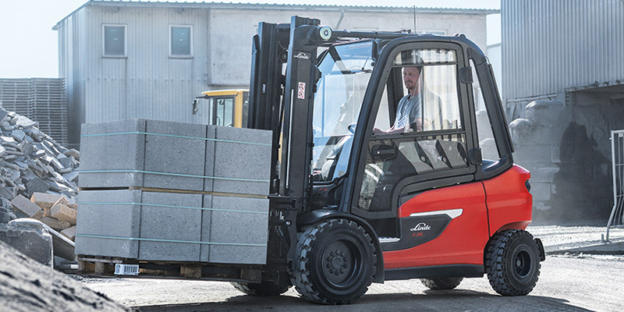Forklifts are useful material handling equipment that can be both indoors and outdoors. From warehouses and manufacturing plants to outdoor construction sites, docks, and container yards, also lifting heavy materials on the roughest terrain. Forklift trucks are versatile and help operators lift, carry, and store heavy cargo with ease.
While outdoor forklifts are extremely useful, outdoor applications require specifications of the forklift to be different than the one for indoor applications. So here are a few tips that can help you ensure maximum safety and avoid accidents while working outdoors.
Maintain your Forklift Regularly
On being exposed to outdoor elements the overall lifecycle of the equipment can decrease. Outdoor forklifts naturally have the potential to wear out early and require maintenance earlier than those deployed indoors. It is important for the operator to ensure scheduled maintenance and servicing.
Safety checks like oil, fluid, and coolant levels are vital to reduce hazards. Low coolant levels can lead to overheating, which can cause damage to the engine, fluid pipelines, and electronics of the diesel forklift truck. Poorly inflated tires and a lack of essential fluids prior to use can be exceptionally hazardous. The operator must always keep the tire pressure in check. Low tire pressure can increase the chances of running flat which makes the reach truck inoperable, in turn, reducing productivity.
Stay Vigilant
Working outdoors also calls for unpredictability. In a closed indoor environment, the workforce and material handling jobs can easily be streamlined to reduce hazards. However, operating forklifts in outdoor applications should be vigilant and always keep their surroundings in check. They should be able to continuously recognize potential hazards, such as obstacles and pedestrians, and avoid accidents. It's important to stay calm and focused while driving the reach truck with both hands on the wheel. It is also mandatory to operate the forklift according to the guidelines and take into consideration the safety features of the forklift.
Establish and Use Safety Systems
Effective safety communication is the key to successful and productive material handling operations. Any communication gaps between the team and the forklift operator can lead to damage to man, machine and load. When everyone knows when, where, and what task is taking place the risk of accidents decreases.
The forklifts have Safety systems to ensure that the forklift is operational with utmost safety.
Keep a note of the Weather
Weather can present new challenges for the operators. It is the biggest factor affecting outdoor working conditions directly. It is important for workers and operators to have a clear understanding of the impact of the weather on their ability to function safely.
Linde forklifts are weather operational and can work in various weather. Check with product manual whether the forklift can work in the work environment required or not. Forklifts are heavy machines and trained operators are mandatory for all equipment operation. Alongside, all the staff should have regular refresher training to keep their knowledge up to date. By following these tips, operators can greatly reduce the risk of an incident occurring, promoting the safety and efficiency of the construction site, dockyard, or other outdoor environments.
